👉 What is an Adverb?
Adverb is a word that modifies a verb, adjective, determiner, clause, preposition, or sentence.
Adverbs can tell you how something is done, for example, speak nicely or work hard. Adverbs can also tell you how much or how many of something you have.
👉 List of Adverbs

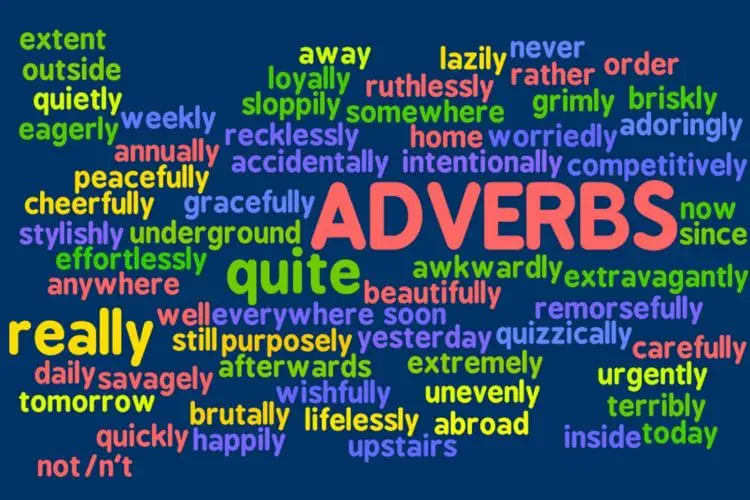
👉 Types of Adverb
Adverbs of time,
Adverbs of manner,
Adverbs of degree,
Adverbs of place,
Adverbs of frequency
The 5 Basic Types of Adverbs
Adverbs provide a deeper description of a verb within any sentence. There are five basic types of adverbs in the English language, namely that of Manner, Time, Place, Frequency, and Degree.
Here is a brief explanation of the meaning each has, along with example sentences using each type of adverb.
👉 Adverb Examples
👉 Adverbs of Time
An adverb of time provides more information about when a verb takes place. Adverbs of time are usually placed at the beginning or end of a sentence. When it is of particular importance to express the moment something happened we’ll put it at the start of a sentence.
Examples of adverbs of time: never, lately, just, always, recently, during, yet, soon, sometimes, usually, so far
- So far, we have found twelve grammar mistakes.
- I haven’t been going to the gym lately.
- We recently bought a new car.
👉 Adverbs of Place
Adverbs of place illustrate where the verb is happening. It’s usually placed after the main verb or object, or at the end of the sentence.
Examples of adverbs of place: here, there, nowhere, everywhere, out, in, above, below, inside, outside, into
- We went into the cave, and there were bats everywhere!
- One day when my dad wasn’t paying attention to where he was going, he walked into a wall.
- There aren’t any Pokémon here, let’s look somewhere else.
👉 Adverbs of Manner
Adverbs of manner provide more information about how a verb is done. Adverbs of manner are probably the most common of all adverbs. They’re easy to spot too. Most of them will end in –ly.
Examples of adverbs of manner: neatly, slowly, quickly, sadly, calmly, politely, loudly, kindly, lazily
- The young soldier folded his clothes neatly in a pile at the end of his bunk.
- I politely opened the door for my grandmother as she stepped out of the car.
- A fat orange and white cat rested lazily on the sofa.
👉 Adverbs of Degree
Adverbs of degree explain the level or intensity of a verb, adjective, or even another adverb.
Example of adverbs of degree: almost, quite, nearly, too, enough, just, hardly, simply, so
- Can I come to the movies too?
- Aren’t you hungry? You’ve hardly touched your dinner.
- I’m so excited to see the new James Bond movie!
👉 Adverbs of Frequency
Adverbs of frequency explain how often the verb occurs. They’re often placed directly before the main verb of a sentence.
Examples of adverbs of frequency: never, always, rarely, sometimes, normally, seldom, usually, again
- I rarely eat fast food these days.
- Tom usually takes his dog for a walk before breakfast.
- They always go to the same restaurant every Friday.
👉 Conjunctive Adverb
A conjunctive adverb is a type of adverb that joins two independent sentences or clauses of any kind. This type of adverb is used to connect two parts into one longer sentence.
These parts can be whole sentences that need to be connected into one longer sentence or smaller clauses that need to be connected as well.
Adverbs usually modify one verb, but conjunctive adverbs modify entire sentences because they connect larger parts than just one word.
Conjunctive adverbs are used to join together parts in order to form a larger thought. This means that the final sentence explains more than the two smaller ones would if they were still divided.
Conjunctive adverbs serve different functions, such as:
addition, comparison, concession, contrast, emphasis, summarize, illustrate a point, or signify time.
Conjunctive adverbs are used to connect ideas, and to form larger thoughts with longer sentences. These sentences are divided by a semicolon (;).
Here are some notable examples:
- I wanted to go have ice cream after work; however, my friend wanted something else.
- He had studies all day and night; nevertheless, it wasn’t enough to pass the test.
- It was never going to work between us; therefore, we decided to go our separate ways.
- I had to work the whole weekend; in addition, there was also another contract from a month ago I had to deal with.
- If you decide to start a diet you will see the improvement in your life soon; for instance, you’ll have more energy during the day.
- She was driving home from her friend’s place; meanwhile, her husband was busy preparing her a surprise.
👉 Adverb Clause
Usually, an adverb is just one word which modifies or describes, a verb. An adverb clause, on the other hand, is an entire clause which functions as an adverb. This clause is a group of words, or an entire sentence, which modifies a verb.
One adverb adds some detail to the verb. An adverb clause adds more detail to the verb and describes precisely. An adverb clause can answer questions like:
How? What? When? Where? How much? And others.
Like any clause, an adverb clause has to have a subject and predicate in order to be complete. An adverb clause can appear in the beginning, middle, or end of the sentence. The adverb clause is always divided by a comma if it’s in the beginning or middle of the sentence.
- Since I work from home, I don’t have to eat in restaurants often.
The adverb phrase is in the first sentence. The subject is “I” and the predicate “work,” so the clause is complete. This adverb clause answers the question: where?
- Whether you like it or not, you have to pay taxes.
Here the subject is “you” and the predicate is “like it or not.” There are different ways to form an adverb clause. This adverb clause answers the questions: how? and why?
- Whales, although they are large, don’t eat anything but plankton.
This adverb phrase is in the middle of the sentence, and it’s divided by commas. The subject is “they” and the predicate is “are large.” This adverb clause answers the question: how? (big are they / do they look)
- Because he missed the first bus he ran like his life depended on it.
Since the adverb phrase is at the end of the sentence is does not always need to be divided with a comma. The subject is “he” and the predicate “ran.” This adverb clause answers the questions: how? and why?
- I’m going to look for a new job when I get back from my trip.
Here the subject is “I” and the predicate is “get back.” This adverb clause answers the question: when?
👉 Adverb Phrase
An adverb phrase is a group of words that function as an adverb. Unlike the adverb clause, an adverb phrase does not need a subject and predicate. An adverb phrase is two or more words that modify the verb.
Adverb phrases are used to describe the verb in more detail than just one adverb would. Since they are composed of more than one word they can answer a different set of questions. Adverb phrases often answer the questions:
How? Where? Why? and When?
These questions need more than one adverb to be answered completely. An adverb phrase can appear anywhere in the sentence, and they don’t need to be divided by commas.
They are, however, mostly at the end of the sentence, and sometimes the beginning.
- Because the boss is late the meeting will start later than usual.
This adverb phrase is used to answer the question: when? It is at the end of the sentence and gives more details about why the meeting is not happening when it usually does.
- Like in every fairy tale they must kiss before sunset to break the curse.
This adverb phrase also answers the question: when? Here it describes the exact time when something must happen.
- Put the flowers on the kitchen table.
This adverb phrase answers the question: where? The person speaking wants the flowers to be put at a specific place.
- We used to have a holiday house right by the beach.
Here it is also answering the questions: where? It describes specifically where the house is, and how close to the beach it actually is.
- There were so many cars that they were moving frustratingly slowly.
This adverb phrase answered the question: how? It describes how slow the cars were going, and how the person feels about it. They are frustrated because of how slow they are going.
- She always completes her tasks without care.
The question answered is: how? It describes how careless the person is when completing her tasks.
- To understand better how to do the job she read some books.
This adverb phrase is at the beginning of the sentence and answered the question: why? It describes why the person has to read some books.
- He went online and searched all day for more information.
The question answered is: why? Here it describes why the person went online and had to search all day. Because they need more information they need to complete the search.
👉 Adverb vs Adjective
ADJECTIVES describe THINGS
a beach, a jacuzzi, a cocktail, the weather, an idea, sunglasses, your iPad, your flip-flops
and PEOPLE
a girl in English class, your upstairs neighbours, Beyoncé, Ryan Gosling, your mother-in-law, Dracula
- This jacuzzi is really uncomfortable.
- Beyoncé is so ambitious.
- Dracula was an affectionate man.
- Ryan Gosling is a spiritual person.
- Her sunglasses are insane.
- My upstairs neighbours are really energetic.
- It’s prohibited to burn tyres on thisbeach.
- Your iPad is so old-fashioned.
- My flip-flops are cute.
- Your mother-in-law is so upbeat.
- I met a magical girl in English class.
- That wasn’t a very good idea.
ADVERBS describe EVERYTHING ELSE
verbs: sing, laugh, complain
adjectives: prohibited, cute, upbeat
- Beyoncé sings loudly.
- Dracula laughed dramatically behind the curtain.
- I complain about my upstairs neighbours daily.
- It’s strictly prohibited to burn tyres on this beach. .
- My flip-flops are absolutely cute.
- Your mother-in-law is incredibly upbeat.
ADVERBS can even describe OTHER ADVERBS
- Beyoncé sings really loudly.
- She can sing incredibly beautifully.
- In Dracula’s castle, people disappeared surprisingly quickly.

More for you:
List of Commonly Used Participial Adjectives!
Order of Adjectives
👉 Adverbs of Frequency
What is an adverb of frequency?
Adverb of frequency is a word that tells us how frequently or how often something happens.
- I always eat breakfast in the morning, even when I am late for work.
1. List of the most common adverbs of frequency:
- always
- usually
- sometimes
- never
- occasionally
- rarely
- seldom
- frequently
- often
- regularly
- hardly ever
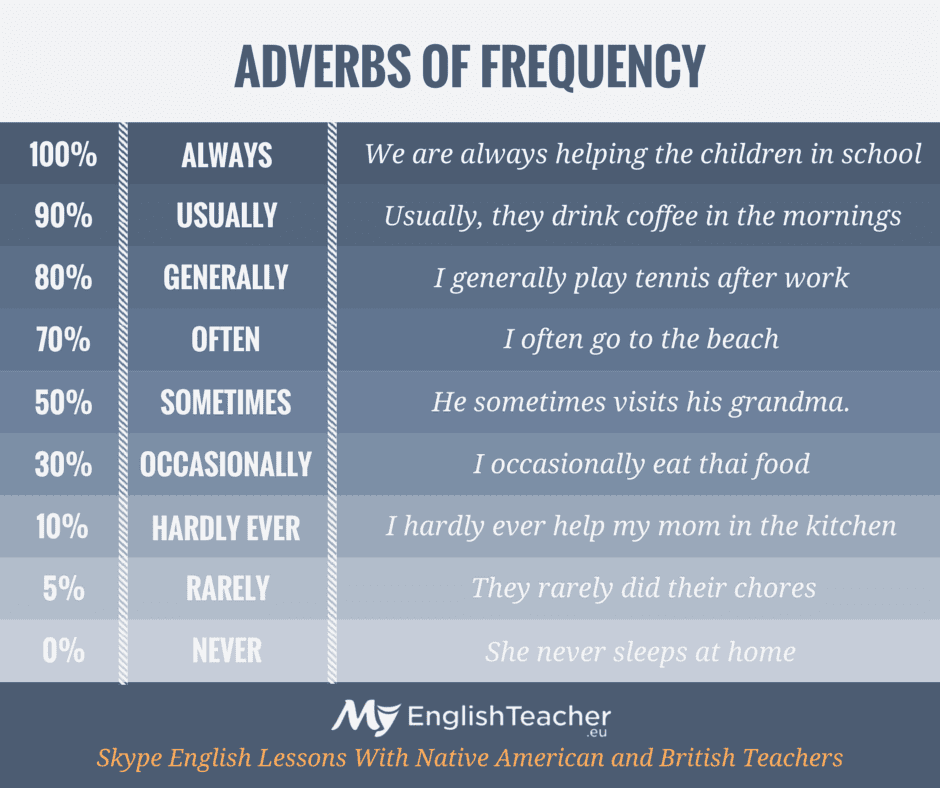
2. Position in a sentence
a) We usually put the adverbs of frequency in the middle of the sentence, between the subject and the verb, but after auxiliary verbs:
- I often go to the beach.
- He sometimes visits his grandma.
- They usually drink coffee in the mornings.
- I hardly ever help my mom in the kitchen.
b) Auxiliary verbs:
- He is usually very happy.
- We are always helping the children at school.
- I have never done anything bad.
- She is always cooking pasta.
NOTE: the verbs have, has, and had are auxiliary verbs only when used with past participle:
- I have never eaten a snake.
- She has never tried coconut water.
But has, have, and had are normal verbs when they are not used with past participle:
- I always have my lunch at school.
- He seldom has English classes.
- We often had dinner late at night in college.
c) We can put occasionally, frequently, usually, often and sometimes in the beginning of the sentence in order to make it stronger. However, other adverbs do not sound good in the beginning of the sentence:
- Occasionally, I go to the beach.
- Sometimes he visits his grandma.
- Usually, they drink coffee in the mornings.
- Always I go to the beach. INCORRECT
- I always go to the beach. CORRECT
- Often, I go to the beach. INCORRECT
- I often go to the beach. CORRECT
NOTE: the verbs do, does, and did are auxiliary verbs only when they are used in questions or negatives:
- Do you often go to the cinema?
- He doesn’t always eat grapes.
In other cases, do, does and did are normal verbs:
- She never sleeps at home.
- They rarely did their chores.
If the auxiliary verb is negative the adverb of frequency might go before or after it:
- He doesn’t usually cook at home.
- He usually doesn’t cook at home.
- They don’t often go to the cinema.
- They often don’t go to the cinema.
BUT:
- We aren’t always late for work.
- We always aren’t late for work. INCORRECT (say ‘We are never late for work’)
e) In the question, we put the adverbs of frequency before the main verb:
- Do you often go to the beach?
- Do you sometimes visit your grandma?
BUT:
- Is she always late for soccer practice?
- Are they usually so grumpy?
I hope you find this information useful.
👉 Adverbs of Time
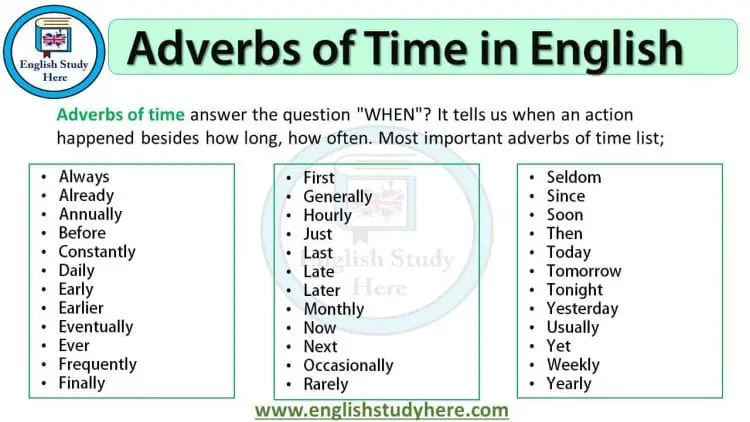
- Always
- Already
- Annually
- Before
- Constantly
- Daily
- Early
- Earlier
- Eventually
- Ever
- Frequently
- Finally
- First
- Formerly
- Fortnightly
- Generally
- Hourly
- Immediately
- Infrequently
- Just
- Last
- Late
- Later
- Lately
- Monthly
- Not until
- Now
- Normally
- Never
- Next
- Often
- Occasionally
- Previously
- Quarterly
- Rarely
- Regularly
- Recently
- Seldom
- Sometimes
- Since
- Soon
- Still
- Then
- Today
- Tomorrow
- Tonight
- Yesterday
- Usually
- Yet
- Weekly
- Yearly
👉 Adverb -LY

👉 Adverbs of Quantity
Adverbs can tell you how something is done, for example, speak nicely or work hard. Adverbs can also tell you how much or how many of something you have.
Every noun is either countable (cat- cats, dog- dogs, elf- elves, fairy- fairies etc.) or uncountable (time, information, magic, happiness, witchcraft etc.) and this is something you need to consider when choosing an adverb to go together with a noun.
COUNTABLE NOUNS
With countable nouns, you may use the following adverbs:
MANY / MORE
- My neighbour has many cats and she wants more.
A LOT / LOTS
- I want a lof of dogs and I want lots of cats too!
FEW / FEWER
- There are just a few fairies left in the forest and soon there will be fewer.
TOO MANY / TOO FEW
- There are not too many fairies left and there are too few elves.
(NOT) ENOUGH
- You can’t have enough cats!
UNCOUNTABLE NOUNS
MUCH / MORE
- I haven’t got much time to spend with my dogs. I need more free time.
A LOT / LOTS
- There’s a lot of magic in this forest and lots of witchcraft.
LITTLE / LESS
- I have little information on witches and even less on dragons.
TOO MUCH / TOO LITTLE
- You spend too much time with your dogs and too little with your friends.
(NOT) ENOUGH
- That’s enough happiness for a lifetime.
You can also use adverbs to describe the degree to which something is. These adverbs may be used BEFORE ADJECTIVES (powerful, friendly, kind, crazy, rude, scary, dark etc.)
TOO
- This spell is too powerful, don’t use it indoors.
SO
- It’s so powerful, it can turn a hundred people into frogs.
A LITTLE (BIT)
- Be careful with that cat lady. She’s a little bit crazy.
ENOUGH (comes after the adjective)
- She’s a nice person, she’s just not friendly enough.
(NOT) VERY
- I would say she’s very rude.
QUITE
- This forest is quite scary.
RATHER
- That dragon is rather scary, too.
PRETTY
- It’s pretty dark in here.
👉 Adverbs Lesson Plan (PDF) 👈 click here to download
📥
👉 Noun + Adverb Examples
Hanger on: is a person who attaches themselves to another person or a group for the sole purpose of trying to gain something from that person or group.
What the person gains can be anything that they see as advantageous. It can be something as small as attention and as large as financial gain. People in a position of fame or power often have or are exposed to people who hang on to them.
- There were many hangers on at the concert tonight.
- Unlike those hangers on, I’ve been friends with her since we were kids, and I want nothing from her.
Passerby: is simply a person who is going by something. This word is usually used to describe someone who is walking. The person may be walking by something of significance, or they could just be walking by a restaurant.
- We love to watch all the passersby as we eat our lunch near the window.
- A random passerby was a witness to the crime.
Overcoat: is a long warm coat, that is worn in colder months over fall or winter clothes.
- I’m going to the store to shop for a new overcoat for the winter.
- She wore a beautiful bright red overcoat.
Overcoat can also refer to the top layer of paint. It’s usually a clear layer of paint that is used to protect other paint colors.
- As soon as we put on the overcoat we’re all done painting the house.
- Wow, you made a beautiful painting, make sure you put an overcoat layer on it to protect it.
Afterthought: is something that is thought of later, or it can be something that is added later. What is forgotten could be a thought or a thing, or even a person. It can be anything that someone thinks of later or after the fact.
- We didn’t actually plan to invite him to the birthday party, the invitation was an afterthought.
- We got to the store and then at the last minute decided to get a cake, it was an afterthought.
Undertone: refers to a feeling or quality that is underneath the surface. For example a family may seem happy and perfect, but you can tell that there’s something negative or unhappy underneath the surface that they don’t talk about publicly. That negative covert feeling is an undertone.
- Even Though she was always smiling, there was a sad undertone, and you could tell she missed her sister.
- Despite all of the arguing there was a clear undertone of love between the couple.
An undertone can also be a muted or quiet sound or color. As a sound it could be murmuring or whispers. As a color, an undertone is simply a non bright or vibrant color.
- When he walked into the room, he could hear the other students talking in undertones.
- I don’t want the color to be too bright, maybe a pink undertone.
Foresight: refers to the ability to predict or anticipate the future. Foresight does not refer to being psychic or making psychic predictions. It refers to someone being able to anticipate someone’s needs or something that’s going to happen based on research or preparation. For example an assistant that can predict his or her boss’ needs has foresight.
- Part of what makes her so great at her job is her foresight.
- A good CEO must have foresight, especially during turbulent times.
Overload: refers to someone or an organization being overwhelmed or having too much going on and it is becoming a burden. It can refer to a mental burden, or it can refer to there physically being too much weight.
- He felt overloaded by all of the work that he had to get done by Friday.
- The truck was overloaded and the trucker had to remove some of his cargo in order to meet the weight limits requirement.
Outpatient: is a medical patient that is not treated in a hospital, but at their home or at a different facility. Sometimes a patient will have a procedure and then will be sent home to recover. The doctor will still check to see that their recovery is going as scheduled, or they may be visited by a nurse, but they will not have to stay overnight at the hospital. This is an outpatient.
- After surgery, you will spend 2 days in the hospital and if everything goes well, you will be treated as an outpatient.
- Having the care of a nurse allows him to be able to be cared for as an outpatient.
👉 Adverb Placement
Using adverbs in a sentence is quite flexible, still it is not entirely our choice where we place them; there are some general rules that we should follow.
For example, adverbs are not usually put between a verb and its object. The typical word order is this:
adverb + verb + object: We often visit museums.
verb + object + adverb: She speaks English well.
In the verb + preposition + object structure the adverb can go either before the preposition or after the object:
- She looked at me suspiciously.
- She looked suspiciously at me.
But if the object contains several words, the adverb goes before the preposition:
- She looked suspiciously at everybody in the room.
Connecting adverbs (which join clauses, e.g. then, next, besides, still, anyway, suddenly, however, consequently) and comment adverbs (e.g. fortunately, surprisingly) can go in front position:
- However, the plan wasn’t fully discussed.
- He worked until six o’clock. Then he left the office.
- Next, I’m going to speak about the advantages of the plan.
- Suddenly there was a loud noise.
- Fortunately, we could take a bus to the village.
Adverbs of indefinite frequency (e.g. always, often, usually, rarely, sometimes, never, normally, generally, occasionally) and adverbs of certainty (e.g. surely, definitely, certainly, probably, perhaps) usually go in mid-position:
- My father often travels to France.
- We rarely go out on Mondays.
- Her brother has never flown an airplane.
- I’ve definitely decided to leave this town.
- She will probably be absent at the meeting.
- The party has obviously been cancelled.
Adverbs of indefinite frequency can also go in end position if they are the main focus of the message (but mid-position is more typical):
- We see our cousins quite often.
- She is very nervous sometimes.
- They eat out occasionally.
Adverbs of certainty like maybe and perhaps typically take front position:
- Perhaps they can’t find the way to the village.
- Maybe you’re right, or maybe not.
Adverbs of manner (saying how the action happens), place (where) and time (when) most often go in end position:
- The secretary read the letter slowly.
- He answered all the questions correctly.
- My sister is sleeping in her room upstairs.
- Did you phone her last night?
- We arrived at the station at ten.
Time adverbs (especially the ones that are frequently used like tomorrow, yesterday, this month, every week, soon, etc.) can also go in front position, especially if the adverb is not the main focus of the sentence:
- Tomorrow we’ve got a meeting with the general manager.
- This week I’m staying with my uncle in the country.
- Soon you’ll see a church, take the second street behind it.
Place adverbs most often go in end position, but front position is also possible (though not very typical):
- At the end of the corridor there was a staircase.
- In this town they don’t have too many restaurants.
- Here we can stop.
Adverbs in -ly can also go in mid-position:
- The train slowly crossed the bridge.
- He angrily shouted at the doorman.
- They will possibly be late for the party.
- She suddenly ran out of the room.
- Would you kindly wait?
Emphasizing adverbs (e.g. very, extremely, terribly, just, almost, really, right) go directly before the words that they emphasise:
- I knew she played the piano very well.
- We were extremely annoyed with his manners.
- I’m terribly sorry about last night.
- Let’s meet in front of the cinema just before seven.
- He kicked the ball almost over the building.
- I’m really sleepy now.
- The police officer walked right past us.
Please note that certain adverbs used at different places of the sentence can substantially change the meaning:
- Only I have fish and chips; nobody else has it.
- I only have fish and chips; I don’t have a drink.
- I have only fish and chips; I don’t have anything else.
- I have fish and chips only; I don’t have rice and peas.
In general, if there are more than one possibilities of placing an adverb in a sentence, you should always be aware of the possible changes in meaning:
- They secretly decided to leave the town. – Their decision was secret.
- They decided to leave the town secretly. – Their departure was to be secret.
ADVERB IN SPANISH:
Adverb = adverbio
ADVERB IN FRENCH:
Adverb = adverbe
☝️ I sometimes cannot fall asleep vs I cannot sometimes fall asleep.
“I cannot sometimes fall asleep” is the correct positioning of this sentence. Sometimes is an adverb of frequency. Adverbs of frequency include often, rarely, never, always, usually,etc.
The rule for the position of adverbs of frequency is they are usually placed before the main verb after a modal verb such as would, should, can, may, etc.
Let’s take a look at some examples:
- They always go to the cinema on Friday nights.
- I never travel by bus.
- The teachers occasionally bring sweets to class.
- He should never hang out with those people again, they are dangerous.
- We can always tell when they are lying.
- I would never quit my job, I love it here!
There is an exception to this rule, if the verb to be is used the adjective must be placed AFTER the verb. For example:
- I am always on time.
- We are never absent from class.
- They were sometimes sent to the principles office.
Some adverbs of frequency can be placed at the beginning or at the end of a sentence to emphasize something.
- Sometimes I can’t concentrate.
- I can’t concentrate sometimes.
- Occasionally they fight.
- They fight occasionally.
Therefore, you could say,
- Sometimes I cannot sleep.
- I cannot sleep sometimes.
This will put emphasize on the fact that you can’t sleep at times.
👉 Adverb JUST
How to use ‘just’? Can you explain the meaning of this adverb?
JUST (adverb)
1. exactly
- This is just what I need.
- This place is just the way I imagined.
- That’s just enough.
2. simply, only, no more than
- It was just another mistake.
- He’s just a friend.
- I met him just two days ago.
3. a short time ago
- I’ve just received a phone call.
- They’ve just bought a new car.
- She’s just finished work.
4. barely, by a narrow margin
- I just caught the train before it pulled out of the station.
- The bullet just missed him.
- He arrived just in time.
Changes in the word order and meaning:
a, Just two weeks ago, Peter won a thousand pounds. (not more than two weeks ago)
b, Two weeks ago, just Peter won a thousand pounds. (no one else won, only him)
c, Two weeks ago, Peter won just a thousand pounds. (not more than a thousand pounds)
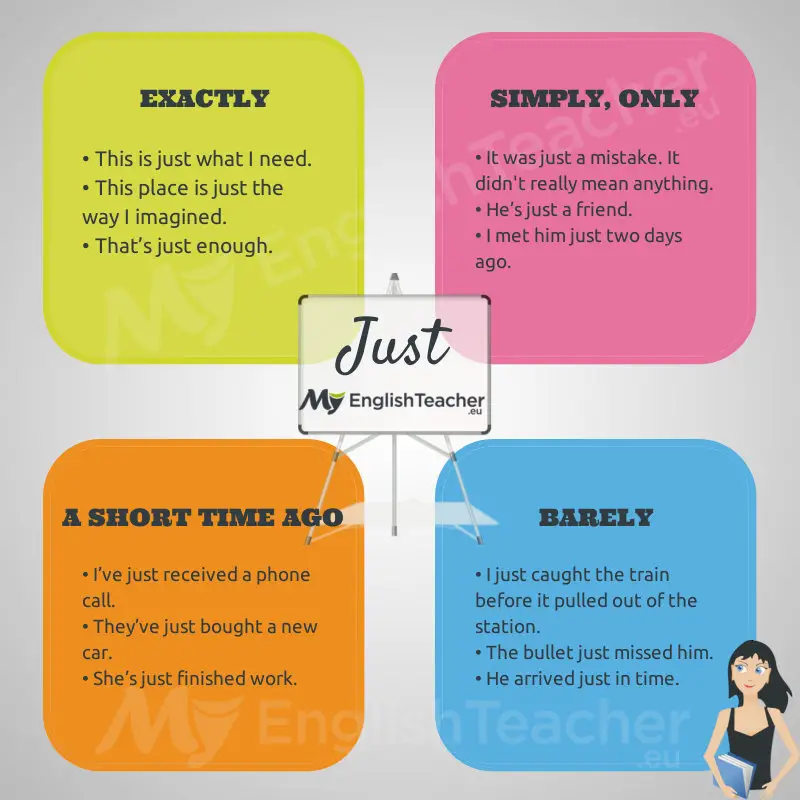
☝️ Adverbs: IN the End – AT the End, Still – Yet, AT the Moment – Actually …
☝️ Where is the position of an adverb in question form and in negative form?
I don’t clear the position of adverb of frequency-place in a sentence. I only know form
Subject +adverb + verb +object
Ex: I always get up late.
Subject + verbe+ adverb +object
Ex: He is usually happy.
But, I don’t clear the place adverb. Where is the position of an adverb. In question form and In negative form.
So, you go it write in positive sentences! Well done!
Now, let’s take a look at negative and questions:
- I don’t always get up late.
- He isn’t usually happy.
So, as you can see, in the negative sentences the adverb of frequency comes right after the negative part (don’t/doesn’t/isn’t/aren’t)
Now, questions:
- Do you always get up late?
- Is he usually happy?
After the subject in questions
I hope it’s clear now.
☝️ Is Correctly an adverb of manner?
An adverb of manner is an adverb, or a modifier of a verb, that tells us how something is done.
Common adverbs of manner are well, badly, gently, silly, and friendly.
Because correctly describes the way that some action is completed, it can be an adverb of manner.
For example, in this sentence:
- She correctly guessed that the interviewer was trying to test her.
In this case, correctly describes the way that the subject of the sentence guessed.
☝️ Can we insert an adverb like this?
Can we break the infinitive and insert an adverb like this?
Your page says…
“6 Ways to Immediately Improve Your English Communication Skills.”
Worth noticing is the infinitive “To improve”. Can we break the infinitive and insert an adverb like this. Should it not have been “6 Ways to Improve Your English Communication Skills Immediately”?
Waiting to hear from you..
Regards,
DEEPAK
MyEnglishTeacher.eu answers:
Hi Deepak!
Splitting the infinitive as is done here is perfectly fine!
There is nothing grammatically wrong with saying “Ways to Immediately Improve Your English”. In fact, both titles are grammatically correct. You can say either one, and they mean the same thing.



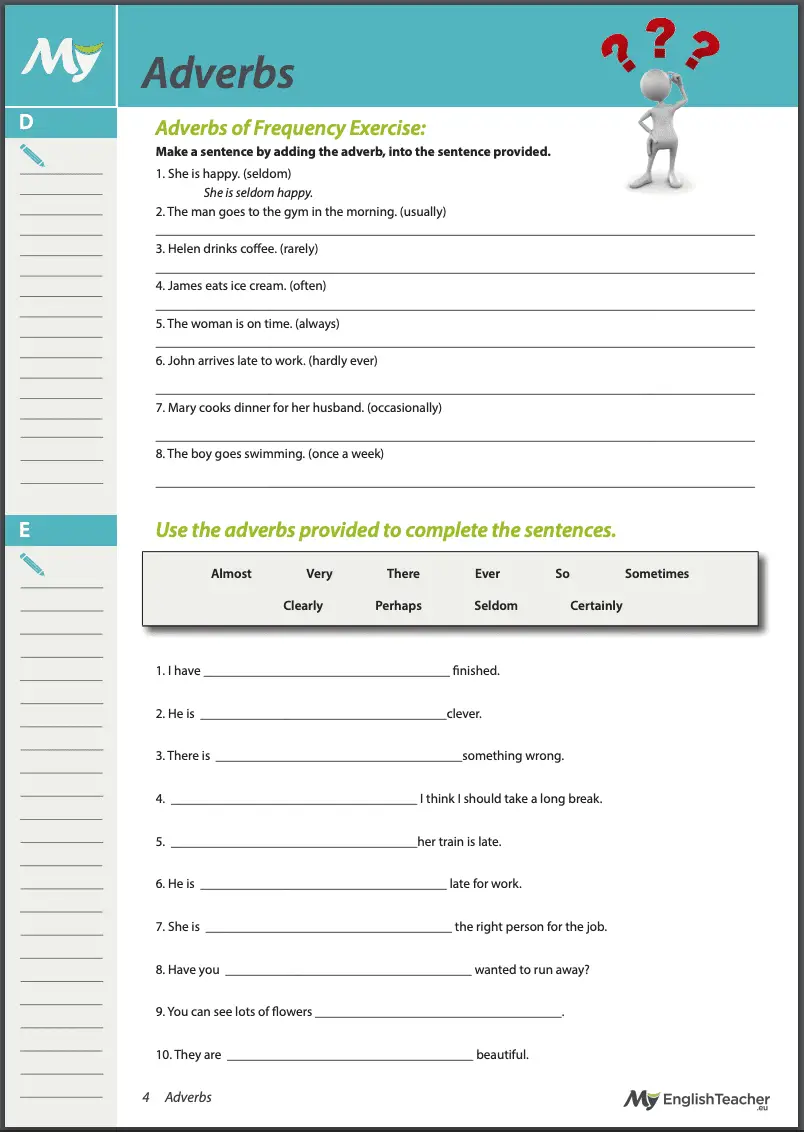


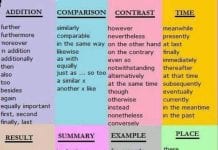

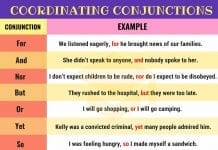
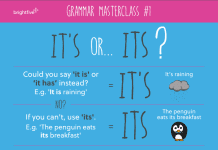
















Great examples. I would like to use your work to my students. Thanks for sharing.
Great! Happy to help!
I don’t know how many types of adjectives there are, but it’s at least eight. That’s because of a fascinating fact about adjectives (at least in my opinion) called ‘Order Force’. It refers to the order into which we put adjectives. I don’t know of anyone who’s aware of this, much less who can tell you what the order is, yet all native English speakers adhere to this rule and when someone breaks it, it sounds strange to us.
The order is: Opinion, Size, Age, Shape, Colour, Origin, Material, Purpose. I don’t think ‘Opinion’ is the best description for the adjectives in that group, I’d have chosen ‘Quality’. I’ll try to construct an example, adding adjectives from a different group as I go along. We start with a noun: boots. They’re blue (colour), made of leather (material) and I bought them in Germany (origin): my blue, german, leather boots.
I’ve had them a long time (age), love them (opinion) and they’re made for walking (purpose): my great, old, blue, german, leather walking boots. If you give an English speaker those adjectives in alphabetical order and ask them to arrange them, that’s the order they’ll put them in! There is one exception that I know of: ‘The big, bad wolf’ where size precedes opinion.That follows another rule called ‘Ablaut Redistribution’. This rule refers to the order we put words that have the vowels ‘a’, ‘i’ and ‘o’ in, namely i-a-o. It also applies to words where not all three vowel sounds appear. Examples are ding dong, bish bash bosh, crisscross, zigzag, tick tock etc.
BTW, if you think I’m one of the rare people who are aware of the order force, I’m not. I got the information from an article in The Guardian newspaper some time ago. It had appeared in one of the digests of interesting articles I subscribe to (I believe it was Pocket, in case you’re interested) and I had to look it up – I’d made a note of it at the time because I knew I wouldn’t remember it.
Great addition. Thank you!
It really helped alot.. THANK YOU FOR YOUR HELP 🙂
Glad to help 🤓
lun merakuj smj nai ai mujy 😍😍😍😍😍😍😍😍😍😍😍😍
A lot of good work here! With the examples of adverb-of-frequency placement, I think there are some additional things to tease out. *All* the adverbs of “infrequency” sound wrong with negatives (so “I don’t usually…” is fine, but both “I don’t sometimes …” and “I don’t rarely …” are strange, and need another choice of adverb from the opposite pole.) Perhaps “sometimes don’t” is acceptable. Among the adverbs of higher probability, as you say, the extreme case of “always” is the only one that needs a word from the opposite pole (“never”). “Don’t always” is indeed natural, but where do you think it falls on your frequency cline? About at “sometimes don’t”? (100%-p(sometimes))?
Both the ‘But’s that follow are presented as exceptions. However, there’s a section later that points out what’s going on: the use of the [be] verb. [Be] is the sole verb here, its role being to couple an adjective to the subject. The adverb here is qualifying an adjective, not a verb. Statements of this kind, like the questions presented, would also follow the adv+adj pattern.
Is she always late for soccer practice?
Are they usually so grumpy?
This site is really helpful